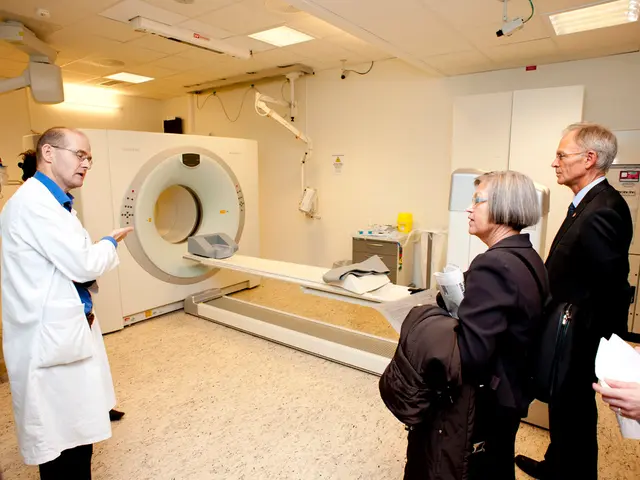Exploration of remedial strategies for C3 glomerulopathy (C3G)
In the pursuit of effective treatment, approaches for C3 glomerulopathy (C3G) aim to support kidney health and curb excessive immune system activity. New therapies focus on interfering with proteins integral to the complement pathway, a key driver of C3G activity.
C3G, a rare condition affecting around 2 to 3 individuals per million, involves the accumulation of protein deposits in kidney filtering tissues, which can lead to kidney failure over time. Since there is no known cure, management begins with strategies to maintain healthy kidney function and immunosuppression.
The condition develops due to overactive components of the body's immune system and genetic changes. Certain genes control proteins that maintain balance within the complement system, a part of the immune system. Changes in these genes provoke C3G. In the absence of C3G, these proteins usually remain inactive until they encounter potential threats like bacteria or viruses. However, in C3G, these proteins become more active than normal, causing an excess of C3 protein and subsequent kidney damage.
Treatment recommendations from the Kidney Disease: Improving Global Outcomes (KDIGO) organization address supportive interventions to help slow and prevent kidney damage. As renal function weakens, immunosuppressive therapies are recommended. Medications like angiotensin converting enzyme (ACE) inhibitors and angiotensin receptor blockers (ARBs) help lower blood pressure and prevent protein leakage through the kidneys.
Immunosuppressant medications, such as mycophenolate mofetil (MMF) and glucocorticoids, are also commonly used once a person with C3G has experienced declining kidney function for at least six months or exhibits other markers of condition progression. Complement inhibitors might be suggested as a treatment option if immunosuppressant medications prove ineffective. Medications like eculizumab and ravulizumab block the activity of the complement system's terminal pathway.
A healthy diet can ease the burden on the kidneys by reducing sodium, potassium, and phosphorus intake, balancing protein and fat levels, and managing fluid balance. Some people with kidney conditions might consult a dietitian to create a diet plan that supports kidney health while also providing necessary nutrients.
Recent developments in C3G treatment are focused on emerging medications that target various parts of the complement system. These therapies aim to halt the sequence of events leading to the activation or breakdown of C3 or other proteins, mitigating the damage C3G causes to the kidneys. Ongoing clinical trials involve medications like pegcetacoplan, ARO-C3, iptacopan, danicopan, avacopan, KP104, and narsoplimab.
These latest treatments for C3G direct their focus on the C3 protein within the complement system, with pegcetacoplan anticipated as a promising new addition to the therapeutic arsenal. Ongoing research seeks to optimize treatment regimens for C3G patients and address uncertainties regarding long-term use and treatment cessation.
C3 glomerulopathy, a condition that affects about 2 to 3 individuals per million, involves kidney failure due to excessive immune system activity and protein deposits in filtering tissues. Since there is no known cure, treatments focus on maintaining healthy kidney function and immunosuppression.
The kidney Disease: Improving Global Outcomes (KDIGO) recommends supportive interventions to slow and prevent kidney damage, such as ACE inhibitors and ARBs for lowering blood pressure and preventing protein leakage. Immunosuppressant medications like mycophenolate mofetil and glucocorticoids are used when kidney function declines, while complement inhibitors might be suggested if immunosuppressants prove ineffective.
A healthy diet can help ease the burden on kidneys, by reducing sodium, potassium, and phosphorus intake, balancing protein and fat levels, and managing fluid balance. Some people with kidney conditions might consult a dietitian for personalized diet plans.
Recent research focuses on emerging medications that target various parts of the complement system to halt the sequence of events leading to C3 protein activation or breakdown, mitigating kidney damage. Ongoing clinical trials involve medications like pegcetacoplan, ARO-C3, iptacopan, danicopan, avacopan, KP104, and narsoplimab.
These latest treatments for C3G primarily focus on the C3 protein within the complement system, with pegcetacopan suspected to be a promising new addition. Ongoing research seeks to optimize treatment regimens and address uncertainties regarding long-term use and treatment cessation for C3G patients.
Other chronic diseases might include medical-conditions like cancer, respiratory-conditions, digestive-health issues, eye-health problems, hearing difficulties, or skin-conditions, among other health-and-wellness concerns. In addition, certain individuals may suffer from autoimmune-disorders, neurological-disorders, or cardiovascular-health complications, requiring unique therapies-and-treatments. Thus, science advances to better understand and provide effective options for managing various medical-conditions.








